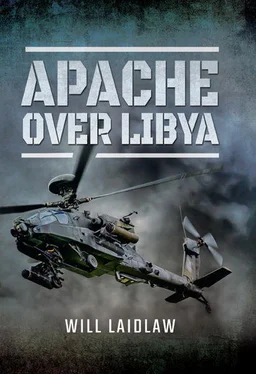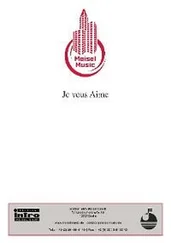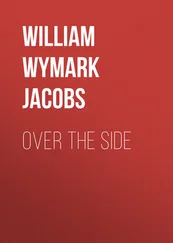With the Commodore and the Captain fully briefed, we were left alone to finish the MISREP. Spirits were up, we’d gone to Libya, fought, come back, targets hit. But there was a demon in the guntape. I phoned Chris at the CAOC and described the mission. The ZU-23-2 was the fear. It was so well hidden that no jet or drone would ever have found it. The pro-Gad gunners were quick and accurate in bringing it into play and they kept firing while our 30mm was landing all around them. These were well trained and motivated soldiers, their standard was high. This was troubling, and we were unhappy about it. It did not matter that the weapons were hidden from the jets. We expected a fight. What took the edge off the elation of going to Libya and back was the professionalism of the incoming fire. Pro-Gad was ready for helicopters.
With the MISREP done and the guntape edited, the Ops team emailed it out. I had one more duty that night – honouring my arrangement with the half dozen or so embarked journalists. I put away my concerns and went to talk to them. I had the tricky problem of needing to give an interview while preserving my anonymity. We agreed that I would sit in the cockpit, helmet on and with the camera angle over my right shoulder. Geraint Vincent from ITN did the prompting, and the footage was pooled and subsequently used by Sky, the BBC and ITN. Just before we started I slapped a badge on to the velcro on my right arm, our well-known Apache image set in a circle, as seen on the arms of all our crews in the UK and Afghanistan. Written around the outside of the circle was ‘Apache Maritime Strike’. The cameraman saw the badge and asked if I wanted it in shot.
‘Yes, absolutely!’ I encouraged him. ‘This is our thing; it’s what we do. We want people to know that.’
This was our new role in combat, a new way of working. Eighteen months of development had brought us to this point, and I was very happy to show the naysayers. The ‘easy-on’ mission had put the Apache at sea firmly in focus, and the huge media interest was going to expose it in every newspaper and news broadcast in the coming days.
After the telly interview I had a sit-down chat with Kim Sengupta and John Ingham. They were writing articles for the big British newspapers and had come on board to get the details of the first mission. By this time it was almost 3.00 a.m. and I was sat drinking tea with the journalists and their MoD media minder; meanwhile, the rest of the aircrew were deep in the catacombs of Ocean enjoying a beer. After half an hour of very careful discussion I was free to find the team. In the empty wardroom a note was left on the table. It read, ‘We’re in 7NA2 – the Seniors Mess. Mr Hall is getting a round in, history in the making! Nick.’
This wasn’t celebration, it was relief and exhilaration. Before we had finished our beer the grainy green image of two Apaches – dark silhouettes against the clear night sky, lifting from the flight deck of Ocean – was on Sky News. We sat, mesmerised for a moment, watching our ghostly selves fly into the black. The footage then cut to the distant bright green light of exploding Hellfire. John flicked to the BBC news and the same footage was being broadcast. Within an hour the redacted guntape of our Hellfire hitting the radar was added to the piece, which was shown constantly for the next 48 hours by everyone from Al Jazeera to Sky and covered on every news website with an interest in the Arab Spring.
Chapter 6
The Seventh Son and the Revolution
The first sparks of revolution in Libya were struck by families of the 1,270 men murdered in the 1996 Abu Salim prison riot. Muammar Gaddafi, looking west at Tunisia and east at Egypt, needed to reassert his control and had their leaders and legal representatives arrested. Civil unrest had always been easy to quash, with an ever-present secret police and thousands of fearful informants. The certainty of incarceration and brutalization for those found guilty made political resistance hazardous. While popular revolution overturned the status quo left and right, Libya looked set to continue its police state existence. The regime was strong, its networks were all pervasive and its bizarre leadership was tolerated.
In 2003 Libya was the only country to buy the ‘if you have a nuclear weapons ambition we’ll come and get you’ threat. Iraq said they didn’t have any, got invaded, and apparently didn’t have any. Iran looked too tricky and North Korea was pointless. But Libya gave up their programme and Britain shook hands with the regime, effectively endorsing Muammar and his boys. Acquiescing to the West’s demands allowed them to remain in power unchallenged. All looked good for the wicked Colonel.
Then the 2011 ripple of democratic aspirations gave the West an advantage. Western leaders could now base their political aims on a local desire for democratic change. Democracy, its promotion and its demand by the people, is instantly respectable, whereas hand-shaking in a tent with a despot is much less attractive. Democratic protest makes for good front-page pictures; the tent scene, not so much.
Huge posters with photographs of the Abu Salim victims hung high behind the bitter grief of their families in Benghazi in early 2011. As they had done for fifteen years, the families and survivors held vigils and protested. Typically, the regime shut these demonstrations down. But the people had had enough and they fought back against the police and the army. Moreover, the picture was no longer local. The international community was interested, and their cameras brought to our attention the desperate humiliation of a people beaten up by its own government.
Encouraged by successful revolts in Tunisia and Egypt, the people stood their ground. The regime took aim and began firing. In Tunisia the military had refused to take orders from the government, effectively rendering the state impotent in quashing the uprising. The people won. Although violent, the protests in Egypt quickly led to political concessions and the eventual resignation of the government. The people won again. The Benghazi protesters hoped for similar success, but neither dynamic was present in Libya. The army started shooting, arrests were made and people disappeared. But the people had had enough and they kept fighting. By mid-February 2011 Libya was in full revolt.
With thousands of contract workers from all over the world caught up in the turmoil, several nations mounted evacuation operations, plucking their people from the desert and the harbours. Even China flew in. North Korea, fearful that talk of revolt would come home and germinate, made her citizens sit it out. Britain got the RAF and the Royal Navy to go in, pick up our people and bring them home. With civil war ramping up, economic production faltered and the everyday necessities of life became scarce. The side that could last the longest as time trickled through the hourglass would win. Libya was besieging itself.
The political opposition set up in Benghazi, and Libya’s second city became the regime’s primary target. At the same time, the central coastal city of Misrata became a rebel stronghold. Gaddafi mobilized his military and the fighting began. NATO got involved, promising the UN a No Fly Zone to take ‘all necessary measures’ to protect civilians under Article VII of the UN Charter. In the UN Security Council ten ‘yes’ votes and zero ‘noes’ were recorded. Germany, India and Brazil abstained. Notably, China and Russia abstained too. Their decision not to veto UN Security Council Resolution (UNSCR) 1973 effectively allowed the NATO mission to shift to regime change – ‘all necessary measures’ had a wide interpretation. Good news for France, Britain and the USA, who all wanted rid of Gaddafi. The morality of the decision to protect the people of Libya appeared to be coincidental. But politics isn’t about morality. At the heart of politics lies power. If power, its reinforcement, its culture and the promotion of its likeness reflects high moral values then that is a good thing. But it is not the main consideration – that is power itself.
Читать дальше












